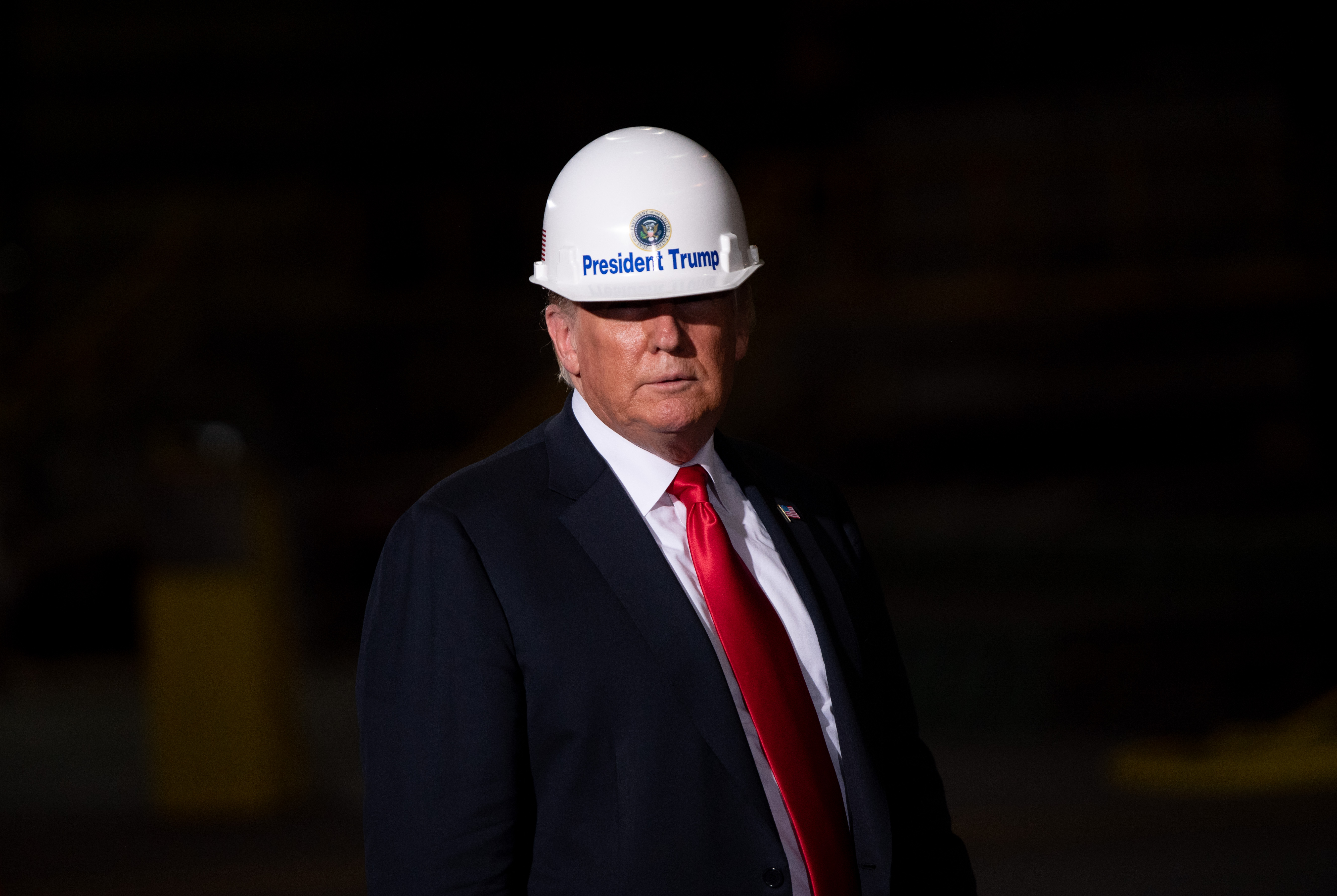Trump's unutterably stupid trade war
Whatever happened to the businessman president?


President Trump is a businessman. Well, he's at least a salesman. Well, perhaps the better phrase is con man. Regardless, all due caveats aside about that "small loan" of millions from his father, Trump has some economic competence. As he takes pains to remind us regularly, he did get a degree in business. Despite the bankruptcies and affection for dirty tricks, he has made a lot of money. At least in the real estate industry, Trump knows what he's doing. There is a reason, like Ross Perot before him, he was able to make his career a major selling point of his campaign.
That's what makes his unutterably stupid trade policies so bizarre. Trump's trade war, if measured by the sheer number of people who will be negatively affected, is one of his worst accomplishments to date. It doesn't have the gut punch of the migrant family separations or the malice of the not-quite Muslim travel ban, but the escalating scheme of retaliatory tariffs his administration has imposed on broad swaths of imported goods will have grave economic consequences both here and abroad.
The president's views on trade are not merely discredited protectionism. Though he does speak of tariffs as a way to give domestic producers a leg up, Trump's primary motive for playing the trade antagonist lies elsewhere. He does not seem to fathom how trade is mutually beneficial. He insists that in any cross-border exchange of money for goods or services, the purchaser somehow loses.
The Week
Escape your echo chamber. Get the facts behind the news, plus analysis from multiple perspectives.

Sign up for The Week's Free Newsletters
From our morning news briefing to a weekly Good News Newsletter, get the best of The Week delivered directly to your inbox.
From our morning news briefing to a weekly Good News Newsletter, get the best of The Week delivered directly to your inbox.
In Trump's economy, if you sell an American product to a foreigner overseas and get their money, you win. If they sell a foreign product to you and take your dollars in exchange, they win. (Perhaps he is so used to the con a fair trade has become inconceivable.)
In recent years, Trump claimed in a July speech at a steel factory in Illinois, "our trade deficit ballooned to $817 billion. Think of that! We lost $817 billion a year over the last number of years in trade. In other words, if we didn't trade, we'd save a hell of a lot of money." The total trade deficit has actually never topped $800 billion, and it came closest in the George W. Bush years. But more significant than Trump's expectedly fuzzy math is his strange claim that stopping trade would save America money.
Technically that's true, but it isn't a good thing. "[W]ithout trade, we could have piles of money," explained Scott Lincicome, an international trade attorney from the Cato Institute, at The New York Times. "But we'd have no food, clothing, housing, etc. So the money would be worthless, unless you swam in it like Scrooge McDuck or something. Throughout history, autarky means poverty, not wealth."
Consider North Korea's masochistic doctrine of self-sufficiency. While a far larger and better resourced nation like the United States would not experience the same degree of deprivation without trade, neither would we enjoy our present advantages. If we didn't trade, we'd save a hell of a lot of money, but we'd also lose a hell of a lot of benefits.
A free daily email with the biggest news stories of the day – and the best features from TheWeek.com
Trump is nowhere near the tradeless world of his factory speech fantasy, but the effects of his trade war are being felt, perhaps most painfully by American farmers, whose industry is already made economically and environmentally precarious by federal meddling. In response to Trump's tariffs on a basket of 800 Chinese goods, China has levied a 25 percent tax on 545 U.S. exports, including agricultural products like rice, beef, pork, and more. Soybean farmers expect a particularly hard hit, as China previously bought fully a third of their product. Maine lobster harvesters are suffering, too, as Chinese buyers turn to Canada, subject to a 7 percent lobster tariff, to avoid 35 to 40 percent taxes on American lobsters.
Rather than call a trade truce, the administration has responded with a $12 billion farm bailout. Beyond the gross hypocrisy of Republicans' supermajority support for the plan — they'd be howling objections had a Democratic president proffered this "fix" — this aid package only compounds the original error. It's like responding to a fever by cranking up the air conditioning and pretending nothing's wrong. The bailout might temporarily ease one symptom, but it will only prolong our pain.
American farmers have a better grasp of economics than does the president. "While $12 billion as a stand-alone number sounds like a lot of money, when you look at the economic impact this trade war has caused, it doesn't even scratch the surface," said a Minnesota soybean farmer named Mike Petefish. His crop has lost $250,000 in value thanks to the president's trade policies as soybean prices have dropped by $2 a bushel — about a fifth of their value — since May. "Imagine someone destroys your car and then says, 'I'll give you a ride to the next place you need to go,'" Petefish added. "Well gee, thanks."
And simply expanding the bailout wouldn't work either. It can't "replace the deterioration of long-term contracts and relationships," Brian Kuehl of Farmers for Free Trade told The Hill. An annual aid package can't make up for the loss of reputation and connections farmers have spent years developing. They don't need (or want) a bailout. They just need normal trade.
With all his vaunted business expertise, Trump really ought to understand.
Bonnie Kristian was a deputy editor and acting editor-in-chief of TheWeek.com. She is a columnist at Christianity Today and author of Untrustworthy: The Knowledge Crisis Breaking Our Brains, Polluting Our Politics, and Corrupting Christian Community (forthcoming 2022) and A Flexible Faith: Rethinking What It Means to Follow Jesus Today (2018). Her writing has also appeared at Time Magazine, CNN, USA Today, Newsweek, the Los Angeles Times, and The American Conservative, among other outlets.
-
 How climate change is affecting Christmas traditions
How climate change is affecting Christmas traditionsThe Explainer There may be a slim chance of future white Christmases
-
 The MAGA civil war takes center stage at the Turning Point USA conference
The MAGA civil war takes center stage at the Turning Point USA conferenceIN THE SPOTLIGHT ‘Americafest 2025’ was a who’s who of right-wing heavyweights eager to settle scores and lay claim to the future of MAGA
-
 The 8 best drama movies of 2025
The 8 best drama movies of 2025the week recommends Nuclear war, dictatorship and the summer of 2020 highlight the most important and memorable films of 2025
-
 Has Zohran Mamdani shown the Democrats how to win again?
Has Zohran Mamdani shown the Democrats how to win again?Today’s Big Question New York City mayoral election touted as victory for left-wing populists but moderate centrist wins elsewhere present more complex path for Democratic Party
-
 Millions turn out for anti-Trump ‘No Kings’ rallies
Millions turn out for anti-Trump ‘No Kings’ ralliesSpeed Read An estimated 7 million people participated, 2 million more than at the first ‘No Kings’ protest in June
-
 Ghislaine Maxwell: angling for a Trump pardon
Ghislaine Maxwell: angling for a Trump pardonTalking Point Convicted sex trafficker's testimony could shed new light on president's links to Jeffrey Epstein
-
 The last words and final moments of 40 presidents
The last words and final moments of 40 presidentsThe Explainer Some are eloquent quotes worthy of the holders of the highest office in the nation, and others... aren't
-
 The JFK files: the truth at last?
The JFK files: the truth at last?In The Spotlight More than 64,000 previously classified documents relating the 1963 assassination of John F. Kennedy have been released by the Trump administration
-
 'Seriously, not literally': how should the world take Donald Trump?
'Seriously, not literally': how should the world take Donald Trump?Today's big question White House rhetoric and reality look likely to become increasingly blurred
-
 Will Trump's 'madman' strategy pay off?
Will Trump's 'madman' strategy pay off?Today's Big Question Incoming US president likes to seem unpredictable but, this time round, world leaders could be wise to his playbook
-
 Democrats vs. Republicans: who are US billionaires backing?
Democrats vs. Republicans: who are US billionaires backing?The Explainer Younger tech titans join 'boys' club throwing money and support' behind President Trump, while older plutocrats quietly rebuke new administration
